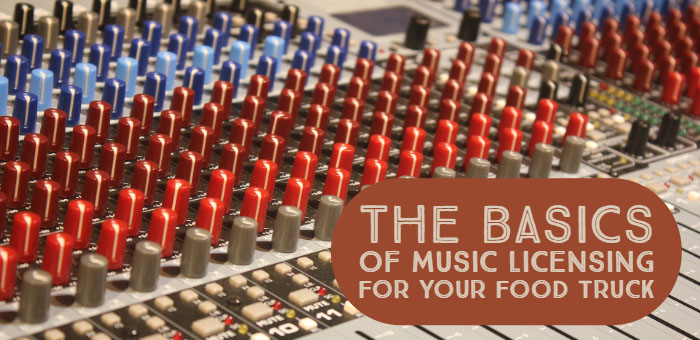So you want to play music from your food truck? While this isn’t at the top of every vendor’s to do list, it certainly is something you need to understand when planning your business. Today I’ll share what you need to know about how to pay for music licensing and the types of music licenses for your food truck.
Music Licensing Basics
Step one, understand the law. The first step in playing music for your customers is to find out if food trucks are even authorized to do this in the areas you operate. Once this is learned, you can determine if playing music is even a possibility. In the remainder of this article, I’ll assume you’ve found that you can play music, and that you want to play music from your truck.
Understanding The Law
Music is protected by copyright law, which means that if you play an artist’s music without consent, you’re infringing on the copyright. To make matters worse, if you’re caught playing unauthorized music from your food truck, you can be liable for damages ranging from $750 to a $30,000 per song played.
“We pay for a monthly Spotify or Pandora subscription! We didn’t download anything illegally.”
This is a common misconception, but it’s understandable. After all, business music licensing is a complex subject.
Most music streaming services are business-to-consumer. This means they are licensed for private, non-commercial use. So feel free to play this streamed music for friends and family, but if you want to play it for food truck customers and employees, you will need a Public Performance License (PPL) from from a performing rights organization (PRO) in order to do so.
Where To Find Performing Rights Organizations
There are five primary performing rights organizations (PRO) that represent songwriters, composers, and music publishers in the United States and Canada.
- ASCAP (American Society of Composers, Authors and Publishers)
- BMI (Broadcast Music, Inc.)
- GMR (Global Music Rights)
- SESAC (Society of European Stage Authors and Composers)
- SOCAN (The Society of Composers, Authors and Music Publishers of Canada)
These organizations are responsible for collecting performance royalties and protecting intellectual property. So to play it safe, if you want to play music from one of the PROs’ music libraries in public, you have to obtain a license from them.
Food Truck Music Licensing Fees
Music licensing fees are generally paid annually and can vary depending on how often you play the music and a number of other factors. So how much does it cost? According to an interview with a BMI rep, a BMI license could be as low as $370 a year; ASCAP starts at $2 a day.
Music Streaming Services
Another option is to pay for a licensed music streaming solution. These services vet approved artists and play only that music. Music streaming services tend to be cheaper, but the number of artists available to play can be limited.
- Pandora for Business – $26.95/mo. + $99 for mood media player.
- Includes: Music licensing, the ability to create stations and standardize music across franchises.
- SiriusXM for Business – $35.99/mo.
- Includes: Music curated for businesses, streaming through internet or satellite, music licensing.
- SoundTrack for Business (Spotify for Business) – $35.99/mo.
- Includes: Music licensing, offline mode, music scheduling.
At the end of the day, there are no shortcuts in music licensing for food trucks. Look at your business model and determine if you need or want to play music for your customers. An affordable, commercial streaming service for background music may be all you need.
RELATED: Types Of Food Truck Licenses And Permits Required To Operate
The Bottom Line
The development of new technology has changed the music industry from the inside out. We hope this was helpful in understanding how music licensing works, why it’s important, and what steps you should take to make sure you are covered.
Do you have a music license for your food truck? Share your thoughts on this topic in the comment section or social media. Facebook | Twitter
Disclaimer: This article is intended to be a general resource only and is not intended to be nor does it constitute legal advice.




